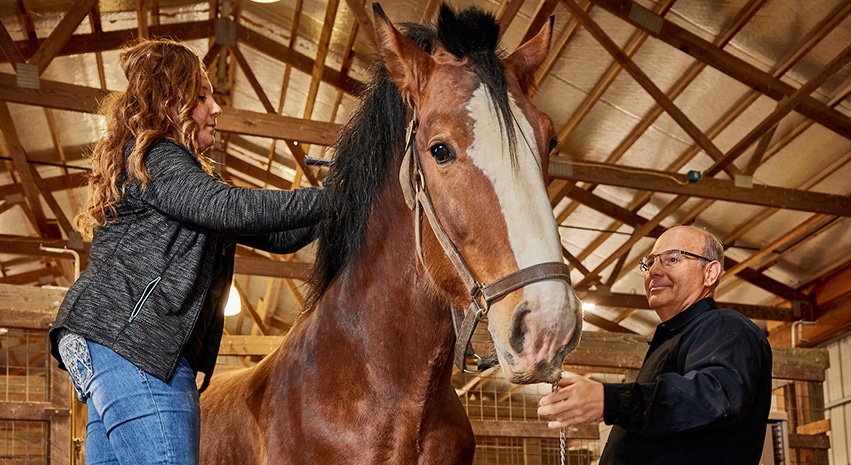The acclaimed American farmer and novelist Wendell Berry once wrote: “We have neglected the truth that a good farmer is a craftsman of the highest order, a kind of artist.” Surprisingly, this may be just as true for those of us whose lives are surrounded by farmland—a sight so ubiquitous to our Midwestern eyes that it often recedes into the background.
Yet in 2019 alone, the output of America’s farms contributed more than $136 billion to the U.S. GDP—a staggering figure. And Alan Knobloch is part of it all, having quietly worked in the agriculture industry for years. His craft is assisting central Illinois farmers from seed to sale, and his art involves breeding one of the world’s most famous and beloved horses: the Clydesdale.
Life in the Valley
Nearly a century ago, during the Great Depression, Alan Knobloch’s grandfather and family moved from northwestern Iowa to Wyoming, Illinois—a small agrarian community 35 miles north of Peoria. Stepping off the train, they gathered the livestock they had brought with them and began making their way to a farm four miles east of town, a place known locally as “The Valley,” where they would put down roots.
Growing up on land his family had tended for two generations, young Alan spent every spare minute working on the farm or for his father’s tiling business. “The teachers would get upset because my dad would pull me out of school to have me help on the farm,” he chuckles. “He’d set me on a tractor, and I’d go back and forth in the fields. I couldn’t reach the clutch, but he showed me where the key was!”
Initiated into farming at an early age, Knobloch always knew he was destined for a life in agriculture. In high school, he worked for an elderly couple who owned a hog farm and learned to love livestock—a critical moment that would come to influence him decades later. “There is just something about it,” he muses. “Every once in a while you get a sick animal, and you have to doctor it back to health. And then you lose some. It teaches you the realities of life very quickly.”
After he graduated from high school, Knobloch worked as a truck driver hauling grain across the country, then managed a farm in Annawan, Illinois—marrying his wife, Mary Ann, in the process. But by 1990, he was ready for a new adventure. What he discovered was an essential part of the ag industry, though it was nothing quite like the farm work he was used to.
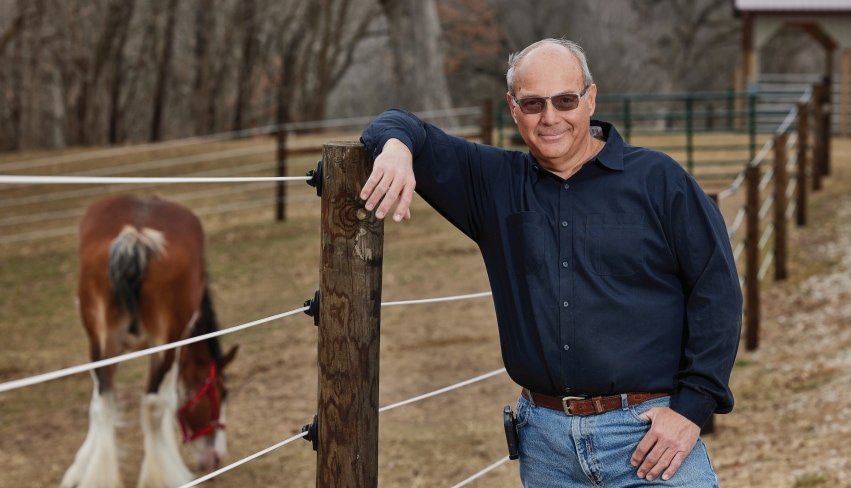
In the mid-1960s, a man named Lawrence Wagenbach founded Akron Services. His concept was simple: farmers needed fertilizer, and Wagenbach would supply them with the product. The venture was tremendously successful, and he soon expanded to selling insecticides and other chemicals. A decade and a half later, he purchased a grain elevator between Edelstein and Dunlap, initializing what Knobloch calls a “two-division company.”
“We’ve got the chemical, fertilizer and agriculture input side of things—and then we’ve got the grain facility, storage, drying, grain merchandising, commodity marketing, commodity trading and brokerage services,” he explains. In the simplest terms, Akron Services connects farmers to the products and services they need—from before planting to after harvest.
“The farmer needs corn to plant, so we sell him seed corn,” Knobloch continues. ”He needs chemicals to spray on that seed corn to kill the weeds, and we supply that. Maybe he hires us to come out and do his spraying or put on his fertilizer. Then he’s got a crop out there ready to harvest. He goes and harvests his grain and combines it. Well, he’s got to have a place to go with that grain! We have grain receiving facilities that take that grain, and we dry and store it.”
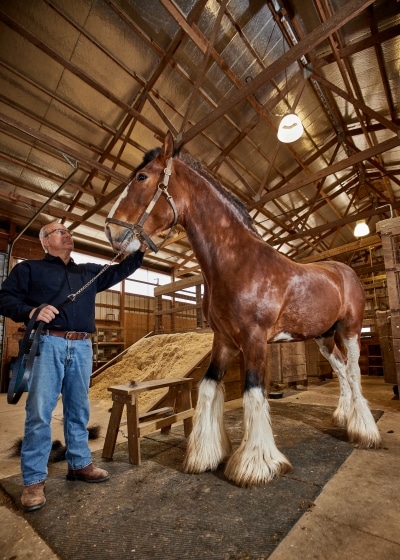 Knobloch manages the grain merchandising division, buying and selling corn from farmers and hedging their investments. Once the commodity is sold to processors like Pacific Ethanol or ADM Peoria, it heads to destinations across the U.S. and around the world.
Knobloch manages the grain merchandising division, buying and selling corn from farmers and hedging their investments. Once the commodity is sold to processors like Pacific Ethanol or ADM Peoria, it heads to destinations across the U.S. and around the world.
About the time Knobloch joined the company, Wagenbach approached him and suggested they form a commodity brokerage service. With their keen insights and experience, the business took off quickly. “The farmer always seems to be searching for help, for information, and for merchandising ideas on how to move his grain, create money flow when he needs it, and take advantage of the latest tools and opportunities in the marketplace today—many of which he’s not familiar with.”
That company would eventually become Cornbelt Marketing, where Knobloch also serves as president. While he spends the majority of his time fulfilling his management role at Akron Services, he loves the synergy between the two—helping farmers across every aspect of their operations. “That’s what those companies are all about: providing needed services in an industry that’s vital to the backbone of America.”
After three decades with Akron Services, Knobloch pauses to reflect. “The most rewarding thing that I can have is a financially successful client who has benefited from dealing with us—when you fill a need and you can do it well,” he notes. “In our business, I don’t know if there’s anything better than that.”
Although Wagenbach recently passed away, Akron Services continues to be owned and operated by his family—and they now deal with more than 25 million bushels of grain each year. Even as he was fully entrenched in the grain side of the industry, Knobloch still felt a longing for the livestock side. What he did not know, however, was just how much it would change his life.
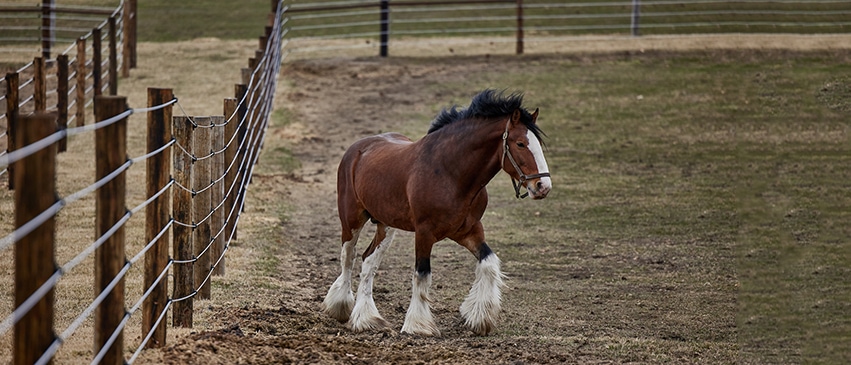
King of Draft Horses
By 1999, Alan and Mary Ann’s household had grown to include three young daughters. Living in a neighborhood in Princeville, they dreamed of an even more fulfilling life in the country. “I’d come home from work and, you know, there’s only so many hours you can spend hoeing the garden or mowing the grass!” he says with a chuckle. “I happened to be traveling to a client’s house, and just a half mile out of Princeville I saw a ‘For Sale’ sign.”
The house was surrounded by a dozen acres of land, and the Knoblochs quickly fell in love and made an offer. On that day, he found the ideal setting where he could fulfill his dream of raising draft horses—and Alamar Acres was born. “I was debating whether I wanted Percherons, Belgiums or Clydesdales,” Knobloch remembers. “We traveled to several different farms… and we ended up deciding that we wanted to raise Clydesdales.”
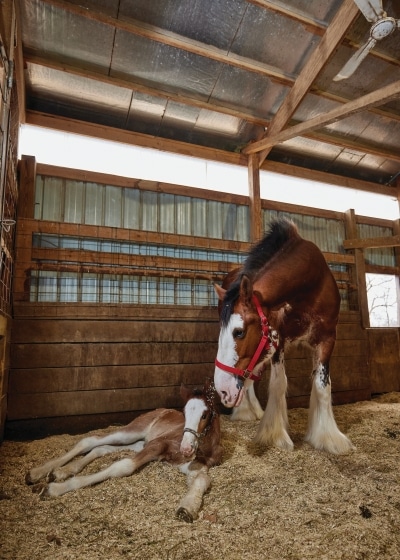 Even prior to moving into their new home, the Knoblochs purchased two older Clydesdale broodmares, Faith and Charity, both of whom were in foal. “And I’ll guarantee you one thing, Faith and Charity did not live up to their names,” he discloses with a laugh. “Faith would kick you out of the barn and Charity would bite you!” On the very day they were set to move in, Faith and Charity were both giving birth to their foals. “While my family was moving in, I delivered those two horses,” he recalls. “I wasn’t very popular that day, but it worked!”
Even prior to moving into their new home, the Knoblochs purchased two older Clydesdale broodmares, Faith and Charity, both of whom were in foal. “And I’ll guarantee you one thing, Faith and Charity did not live up to their names,” he discloses with a laugh. “Faith would kick you out of the barn and Charity would bite you!” On the very day they were set to move in, Faith and Charity were both giving birth to their foals. “While my family was moving in, I delivered those two horses,” he recalls. “I wasn’t very popular that day, but it worked!”
The Clydesdale horse originated in Scotland near the River Clyde, Knobloch explains. “They were bred to pull beer and food wagons around. They were city workers, big and powerful; they never really did go to the country. With its feather—the tuft of hair on its legs—it’s not a good situation to have them on a farm working in the dirt and mud. They are more of a carriage or show horse. They’re exactly what Budweiser has made them famous for. They’re basically the king of the draft horses.”
Between 400 and 500 Clydesdales are registered each year, making it a relatively small breed—and 40 reside at Alamar Acres and Gregglea Farms, Knobloch’s breeding partners in Ontario, Canada. Between the two operations, known collectively as Gregglea Alamar Clydesdales, they have grown to be consistent winners in the show arena. “We love the breeding, the foaling. We love taking our stock to shows and showing them,” Knobloch says with a smile. “It’s an addicting situation for us.”
Of their three girls who grew up around the Clydesdales, the youngest, Kendra, took to them immediately, from the age of six. “She was my shadow outside—she was always with me,” Knobloch recalls. “I’d be building something in the barns, working with the horses… and she’d be sitting on a bale of hay, just watching and asking questions. ‘What are you doing this for? What are you doing that for?’”
“It’s in her blood,” Mary Ann Knobloch adds. “She would get up in the morning at seven o’clock. I would have my cup of coffee, and she would say, ‘Mom, I’ll have it hitched up and ready to roll!’” Now a nurse at OSF HealthCare, Kendra oversees day-to-day operations on the farm and hopes to eventually work at Alamar Acres full-time. “I feel like—especially this year with COVID—you realize it’s not about the trophies or rewards you get; it’s a daily lifestyle that you choose to live,” Kendra observes.
Alan, Mary Ann and Kendra all agree that breeding Clydesdales has given them a unique perspective on life. “You have a mare that has a foal, and the kids fall in love with it—then something happens and it dies,” Alan notes solemnly. “It teaches them great lessons. There’s a lot of uncertainties in life, and you have to learn to deal with them… the good parts as well as the bad parts.”
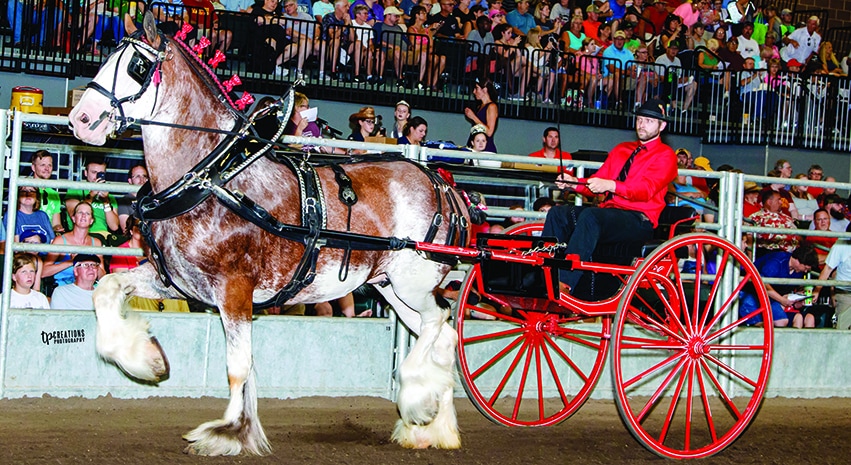
Alongside their Canadian partners, Alamar Acres has gained a reputation for breeding some of the world’s top Clydesdales—including Budweiser’s primary breeding stallion at the famous Warm Springs Ranch in Missouri, home of the Budweiser Clydesdales. “Alamar Theodore is his name,” Knobloch points out. While they do not primarily work with Budweiser, he expresses their importance for the breed as a whole. “They’re a very needed part of the industry. And obviously they’re the ones who put the Clydesdale horse on the map in the U.S.” When the Budweiser Clydesdales are in the area for events, they are boarded at Alamar Acres. “People get kind of excited when they see a Budweiser trailer pull up at the Casey’s in Princeville!”
But it’s not always an easy road. “It seems like every year there’s a week through the winter where it doesn’t get above zero,” Knobloch remarks. “You have frozen waters, a mare that wants to foal, and you’re out in the barn when it’s zero degrees at night. You’re colder than cold, and you wonder, ‘What in the world am I doing this for?’
“But I love the horses,” he adds quickly, answering his own question. “It challenges me mentally and physically, which I need. I guess at this point in time, I just love what I’m doing.”
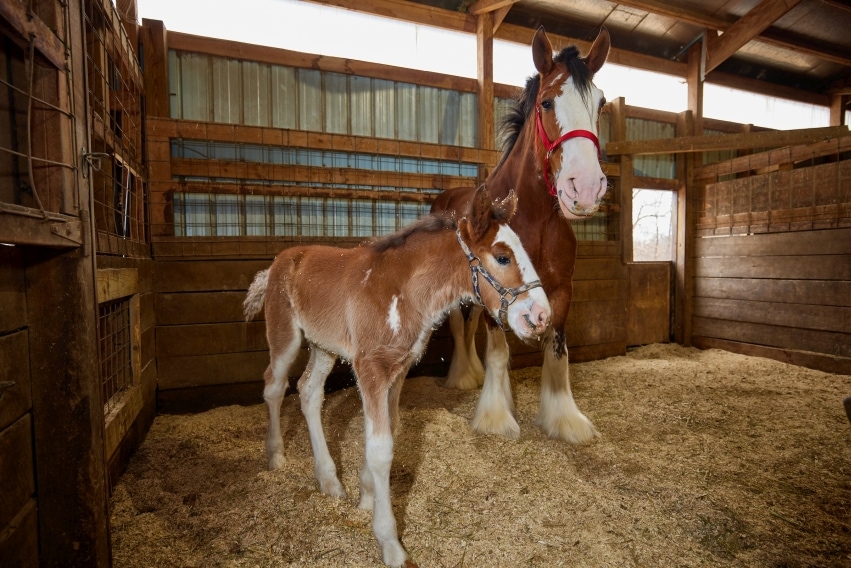
Finding Contentment
Looking to the future, Knobloch says he cannot imagine doing anything else. “My wife asked me when I’m going to retire, when I’m going to sell the horses. I can honestly say, at this point in time… I really can’t remember a day when I did not want to come to work,” he observes. “I don’t know what else I’d rather do than buy and sell corn, work with the team I work with, and go home and mess with the horses.”
Asked about the secret to his success, Knobloch humbly offers that it has less to do with his achievements and more to do with what he has learned in life. “I don’t think I’m successful; I just think I’m content. And the key to that, in my opinion, is hard work and dedication. It will get you a lot of places that people aren’t, but want to be.” PM


